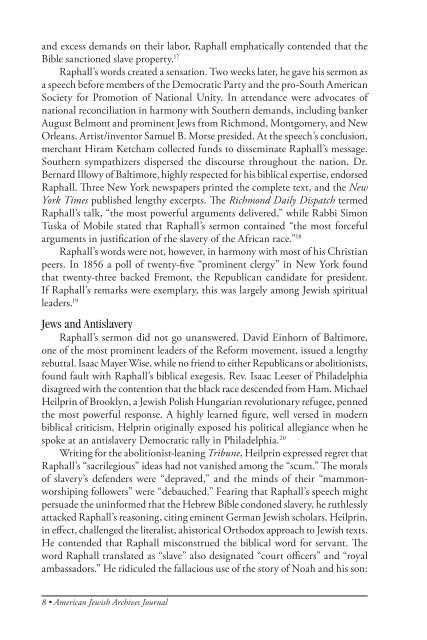American Jewish Archives Journal, Volume 64, Numbers 1 & 2
American Jewish Archives Journal, Volume 64, Numbers 1 & 2
American Jewish Archives Journal, Volume 64, Numbers 1 & 2
You also want an ePaper? Increase the reach of your titles
YUMPU automatically turns print PDFs into web optimized ePapers that Google loves.
and excess demands on their labor, Raphall emphatically contended that the<br />
Bible sanctioned slave property. 17<br />
Raphall’s words created a sensation. Two weeks later, he gave his sermon as<br />
a speech before members of the Democratic Party and the pro-South <strong>American</strong><br />
Society for Promotion of National Unity. In attendance were advocates of<br />
national reconciliation in harmony with Southern demands, including banker<br />
August Belmont and prominent Jews from Richmond, Montgomery, and New<br />
Orleans. Artist/inventor Samuel B. Morse presided. At the speech’s conclusion,<br />
merchant Hiram Ketcham collected funds to disseminate Raphall’s message.<br />
Southern sympathizers dispersed the discourse throughout the nation. Dr.<br />
Bernard Illowy of Baltimore, highly respected for his biblical expertise, endorsed<br />
Raphall. Three New York newspapers printed the complete text, and the New<br />
York Times published lengthy excerpts. The Richmond Daily Dispatch termed<br />
Raphall’s talk, “the most powerful arguments delivered,” while Rabbi Simon<br />
Tuska of Mobile stated that Raphall’s sermon contained “the most forceful<br />
arguments in justification of the slavery of the African race.” 18<br />
Raphall’s words were not, however, in harmony with most of his Christian<br />
peers. In 1856 a poll of twenty-five “prominent clergy” in New York found<br />
that twenty-three backed Fremont, the Republican candidate for president.<br />
If Raphall’s remarks were exemplary, this was largely among <strong>Jewish</strong> spiritual<br />
leaders. 19<br />
Jews and Antislavery<br />
Raphall’s sermon did not go unanswered. David Einhorn of Baltimore,<br />
one of the most prominent leaders of the Reform movement, issued a lengthy<br />
rebuttal. Isaac Mayer Wise, while no friend to either Republicans or abolitionists,<br />
found fault with Raphall’s biblical exegesis. Rev. Isaac Leeser of Philadelphia<br />
disagreed with the contention that the black race descended from Ham. Michael<br />
Heilprin of Brooklyn, a <strong>Jewish</strong> Polish Hungarian revolutionary refugee, penned<br />
the most powerful response. A highly learned figure, well versed in modern<br />
biblical criticism, Helprin originally exposed his political allegiance when he<br />
spoke at an antislavery Democratic rally in Philadelphia. 20<br />
Writing for the abolitionist-leaning Tribune, Heilprin expressed regret that<br />
Raphall’s “sacrilegious” ideas had not vanished among the “scum.” The morals<br />
of slavery’s defenders were “depraved,” and the minds of their “mammonworshiping<br />
followers” were “debauched.” Fearing that Raphall’s speech might<br />
persuade the uninformed that the Hebrew Bible condoned slavery, he ruthlessly<br />
attacked Raphall’s reasoning, citing eminent German <strong>Jewish</strong> scholars. Heilprin,<br />
in effect, challenged the literalist, ahistorical Orthodox approach to <strong>Jewish</strong> texts.<br />
He contended that Raphall misconstrued the biblical word for servant. The<br />
word Raphall translated as “slave” also designated “court officers” and “royal<br />
ambassadors.” He ridiculed the fallacious use of the story of Noah and his son:<br />
8 • <strong>American</strong> <strong>Jewish</strong> <strong>Archives</strong> <strong>Journal</strong>
















